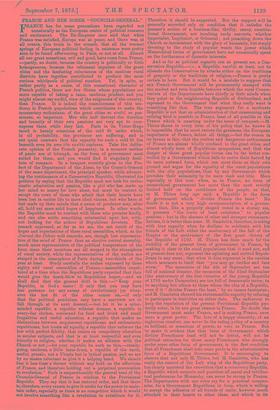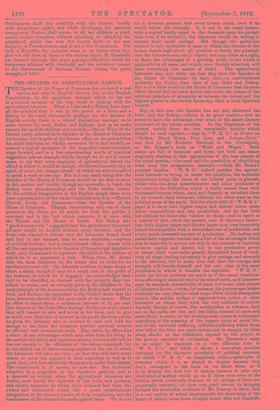FRANCE AND HER SOBER "COUNCILS-GENERAL."
Pt:CE has for some generations been regarded not naturally as the European centre of political romance and excitement. The Ex-Emperor once said that when France was satisfied, Europe was at peace, and there was, at all events, this truth in the remark, that all the warmer springs of European political feeling in existence were pretty sure to be found effervescing in Paris, or not at all. Almost all our great sensations, evil and good, have come from France, —partly, no doubt, because the country is politically so little homogeneous, because the vehement impulses of the great cities and the hesitating reluctances of the cautious rural districts have together contributed to produce the most curious whirlpools of political emotion. Yet, in spite, or rather partly as a cause, of this sensational character of French politics, there are few States whose populations are more capable of taking a tame, cautious, prudent, and you might almost say sordid, view of the exigencies of the country, than France. It is indeed the consciousness of this ten- dency in French populations which contributes to make the momentary enthusiasm of the great cities so exalte', so pas- sionate, so impatient. Men who half distrust the duration and tenacity of their own passions are very apt to over- express them while they last. Paris in its Victor-Hugo mood is keenly conscious of the cold fit under which, in all probability, the provinces are suffering, and is not quite unaware that the capacity for such a cold fit lies beneath even its own ate exaltie raptures. Take the delibe- rate opinion of the French peasantry, in a moment neither of panic nor of triumph, on the form of government most suited for them, and you would find it singularly desti- tute of romance. In a banquet recently given to the Pre- fect of the Department of the Aisne, by the Council-General of the same department, the principal speaker, while advocat- ing the -continuance of a Conservative Republic, illustrated his position by saying that the Republic must not look for enthu- siastic admiration and passion, like a girl who has made up her mind to marry for love alone, but must be content to accept the vows of those who admit that their hearts have been lost in earlier life to more ideal visions, but who have at last made up their minds that a union of prudence may, after all, hold out more solid hopes of happiness. In other words, the Republic must be content with those who promise kindly, and can also settle something substantial upon her, with- out looking for the ardour of Republican devotees. The remark expressed, as far as we see, the net result of the hopes and expectations of these rural assemblies, which, as the Journal des De'bats well remarks, are, though less representa- tive of the mind of France than an elective central assembly, much more representative of the political temperature of the hour, since their members are all steeped in the atmosphere of rural society, while the representatives of the nation are steeped in the atmosphere of Paris during two-thirds of the year at least. Study carefully the wishes expressed by these eighty odd rural assemblies of France,—assemblies consti- tuted at a time when the Republican party expected that they would give the death-blow to Republican hopes,—and we shall find that the general drift is this :—" Keep your Republic, in God's name if only that you may have less pretence for any extasy of revolutionary joy when- ever the hot fit of the cities comes on,—if only that the political pendulum may have a narrower arc to fall through at its next descent,—but let it be a sober- minded republic, a republic without dreams, a republic in every-day clothes, concerned for food and drink and small frugalities and useful education-, a republic that makes no distinctions between acquiescent republicans and enthusiastic republicans, but treats all equally, a republic that enforces the law with perfect fidelity, that insists on compulsory education in secular subjects, and that is at least respectful and even friendly to religion, whether it makes an alliance with the Church or not ;—let your republic be such as this,—steady- going, cautious, a little hum-drum, a republic of the earth, useful, prosaic, not a Utopia lost in lyrical passion, and we are by no means reluctant to give it a helping hand. We should fear it less thaw I throne without any hold on the affections of France, and therefore holding out a perpetual provocation to revolution." Such is unquestionably the general tone of the Councils-General of France in relation to the Provisional Republic. They say that it has restored order, and that there is, therefore, every reason to give it credit for the power to main- tain order, especially as there is no competitor which it would not involve something like a revolution to substitute for it.
Therefore it should be supported. But the support will be generally accorded only on condition that it satisfies the peasant's notion of a business-like, thrifty, canny, constitu- tional Government, not insulting tardy converts, whether Imperialist, Legitimist, or Orleanist ; not preaching down the Church as inconsistent with the glory of humanity, but simply devoting to the study of popular wants the power which Monarchical forms of government have not unnaturally spent on the furtherance of dynastic interests.
And as far as political sagacity can at present see, a Con- servative Republic,—i.e., a Republic careful, at least, not to alienate the Conservatives by attacks either on the traditions of property or the traditions of religion,—France is pretty certain to have. But it would be a mistake to suppose that any French Government will be permanently stamped with the modest and even humble features which the rural Conser- vatives of the Departments have chiefly in their minds when they point to the neighbouring Republic of Switzerland, and represent to the Government that what they really want is something like that. The true argument for a moderate Republie is not that an administration of that unassuming and retiring kind is possible in France, least of all possible in the France which is smarting under the sense of conquest,—M. Thiers shows in every item of his policy that he knows it is impossible, that he must restore the greatness, the European importance of France, before all things,—but the reason in - its favour is this, that the restless and dangerous enthusiasms of France are almost wholly confined to the great cities, and almost wholly born of Republican sympathies, and that the danger of these great popular forces can be far better con- trolled by a Government which fails to excite their hatred by its mere outward form, which can meet them on their own ground and argue for the equality of the rural populations with the city populations, than by any Government which provokes their animosity by its mere rank and title. More especially is this true when, as in France, no form of monarchical government has more than the most strictly limited hold on the confidence of the people, so that, as M. Thiers long ago said, a Republic is the form of government which "divides France the least." No doubt it is not a very high recommendation of a govern- ment that, like a properly shaped vessel in a stormy sea, it presents "the curve of least resistance" to popular passions ; but in the absence of other and stronger recommen- dations, it is better than none. M. Gambetta, therefore, is acting with true sagacity when he declinea to celebrate with his friends of the Left either the anniversary of the fall of the Empire or the anniversary of the first great victory of the Republic of 1792. M. Thiers has done much for the stability of the present form of government in France, by making it clear to the rural populations that it need not, and at present does not, represent the agitating and excited Repub- licans in any sense ; that what it does represent is the caution which murmurs to itself that "you may go further and fare worse." The memories of the 4th of September are too full of national disaster, the memories of the 22nd September (the anniversary of the first victories of the young Republic of 1792 under Dumouriez) are too full of democratic terror, to be anything but odious to those whom the idea of a Republic, even if it "divides France the least," by no means fascinates ; and M. Gambetta showed his statesmanlike sagacity by refusing to participate in festivities on either date. The endeavour to keep the reputation of the present Provisional Republic per- fectly sober, is its one great chance in France. No doubt the Government must make France, and is making France, once more a great power. The love of a happy obscurity, of an inglorious comfort, can never be the ruling policy of a country so brilliant, so conscious of power, so vain as France. But to make it evident that that form of Government which divides Frenchmen least will not be defeat, will not be political ostracism for those many Frenchmen who strongly prefer some other form of government, is the first condition that all Frenchmen shall take some pride in the administrative force of a Republican Government. It is encouraging to observe that not only M. Thiers, but M. Gambetta, who has really the control of the Left wing of the Republican party, has clearly mastered the conviction that a missionary Republic, a Republic which suspects and punishes all moral and intellec- tual preferences for Monarchy, can never be strong in France. The Departments with one voice cry for a practical compro- mise, for a Government Republican in form, which is willing to accept the adhesion of all friends of unity, however mach attached in their hearts to other ideas, and which in its development shall deal cordially with the Church, loyally with proprietary rights, and while developing the material resources of France, shall secure to all her children a good, sound, secular education, without attacking or offending the priesthood which has won the hearty faith of the vast majority of Frenchwomen, and of not a few Frenchmen. For such a Rvublic, the auguries seem to us better every day. And not the least of these is the wisdom which M. Gambetta has learned through the grave popular difficulties which his temporary alliance with Garibaldi and his red-shirts caused to the Government of National Defence during the great struggle of 1870.



































 Previous page
Previous page